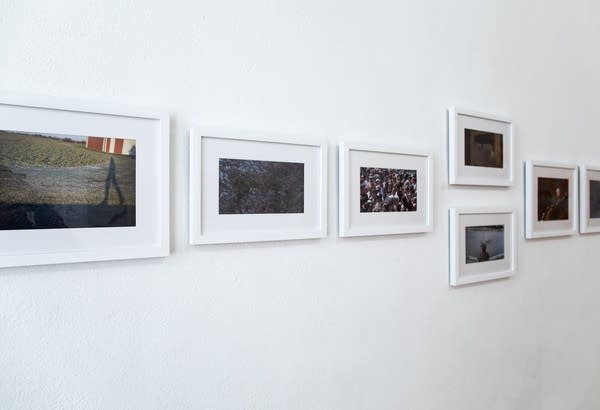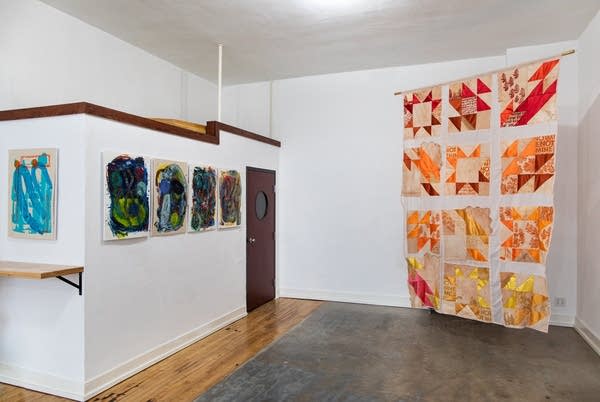Photographer Zoe Prinds-Flash opens new Longfellow gallery, The Pink Slip
March 03, 2022

When Zoe Prinds-Flash was a kid, she dreamed of running an art gallery. “The thing I remember pretending to do at home was sitting and being like, 'Hi, welcome,'” she says, “then going back to writing. That was my fantasy play.”
Twenty years later, Prinds-Flash is living that dream as a real-life gallery director, curating art shows and greeting patrons at the Pink Slip, her new space in south Minneapolis. Through March 10, the Longfellow gallery is exhibiting its first show, Group Show 1, featuring visual work by organizer Shanai Matteson, photographer Graham Tolbert, Fog’s Andrew Broder, and Bon Iver’s Justin Vernon.
In the Twin Cities music community, Prinds-Flash is mainly known as a photographer, having grown up taking pictures of Doomtree shows and becoming a go-to person for band portraits. In addition to her music-focused work, she photographs weddings and serves as the principal photographer of Tence Magazine.
After hosting dinner parties and a few art shows of her own, Prinds-Flash wanted to flex her event facilitation skills further. While biking past the corner of East Lake Street and 40th Avenue South last fall, she noticed a “For Lease” sign and a phone number. “A week later,” she says, “it was mine.”
“I wanted it to be a little rock ‘n’ roll, a little New York, a little tongue-in-cheek,” Prinds-Flash says of the gallery’s name. “A pink slip is a termination letter. But when I was in high school, we would get a pink slip to walk the hall and go to the bathroom. Whether you’re being terminated from your job, or you're getting out of class, the idea is that art comes in those times.”
The gallery’s first show, Group Show 1, is certainly out of the ordinary. All four featured artists are best known for their work in other media: music, activism, and/or photography. Graham Tolbert is a frequent Bon Iver and Big Red Machine photographer (as well as Prinds-Flash’s partner). Shanai Matteson is a cultural organizer who has been aiding the movement to stop Line 3. Andrew Broder and Justin Vernon are musicians.
Group Show 1 features Vernon’s first photography collection, “Pacing.” “Justin has always been really interested in photography,” Prinds-Flash says. The whole show was actually his idea — in an effort to raise awareness for the gallery, he surfaced some of his favorite photographs from his personal trove, from “Paris Piss” to “Osseo Princess.” “They're funny; they're curious; they're interesting; they're quiet,” Prinds-Flash says. “It's not something that you would normally see from him.”

Matteson’s piece, “Overburden/Overlook,” is the largest of the bunch: an approximately 8-by-6-foot quilt of dyed and sewn pieces of fabric. Her grandmother grew up in northeastern Minnesota and married a miner, she says, and told stories about “a red dust that would get in your teeth and all over your house.” Matteson has been gathering fabric from women across Minnesota and dyeing it with overburden, which she describes as “a mining term for the waste rock that is on top of or surrounding something that's going to be extracted.”

Prinds-Flash imagines the Pink Slip as not only a gallery, but also a photo studio and a space for meetings and workshops. She shares it with Tolbert and another colleague, and she anticipates opening it up to community members who may have a need for such a space. “Mutual aid has become such a big conversation,” she says. “Space is a resource, and it is important to provide access to that.”
Prinds-Flash’s thoughtfulness is one of the main reasons Cassidy Wall, founder and creator of Tence Magazine, wanted to work with her. Wall founded Tence in 2021 as a biannual magazine about queer artists. “I think she truly captures a person's personalities, specifically in portraiture,” Wall says. “Because while she obviously strives to be top of her craft, she also isn't forgetting about the people behind the camera.”
Wall and Prinds-Flash met through a mutual friend and did most of their early scheming over FaceTime, Wall says; the first time they met in person was for an editor’s photo shoot. Wall felt comfortable enough to spend the majority of the session in their bra and jeans. “Even right away, I was like, ‘Oh, hell yeah, this is gonna be fantastic,’” Wall says. “Let me take off my shirt, and I'll get in that bathtub, and we'll make some art.”
Although Prinds-Flash does not identify as queer, Wall trusts her to create photos for Tence. “She is such a phenomenal advocate for the community,” Wall says. “[Between] the accessibility that she has afforded me … and her dedication towards the liberation of marginalized communities, [I’m] honestly okay with it.”
Prinds-Flash has been photographing people since she was a teenager, having taken friends’ senior portraits and worked her first wedding at about 17 years old. In that time, she has become highly sensitive to the “heart work” and new set of dynamics inherent in every session. She may not be a photography “gearhead,” but she can extend emotional vulnerability and keep up with the resulting sparks.

“She's so good at capturing these little moments and people,” Matteson says. “It's not contrived; it’s very much these little slices of life.”
“[Portraiture] is also about becoming invisible,” Prinds-Flash says. “I've gotten as many amazing images by pulling back and watching as I have gotten by jumping in and directing … I often seek to control, but when people feel dominated or controlled, they're not going to open.”
Prinds-Flash’s sense of when to pull back furthers Wall’s admiration for her. As Tence’s photographer, “[Zoe] doesn’t demand her own space,” Wall says. “She is just consistently showing up and communicating through every avenue about the issues that she supports and advocates for.”
The Pink Slip, located at 3004 40th Avenue South in Minneapolis, is open through March 10 from 2-5 p.m. The suggested donation is $10, and all art pieces are available for sale. A portion of the proceeds will benefit Indigenous-led nonprofit Honor the Earth.

